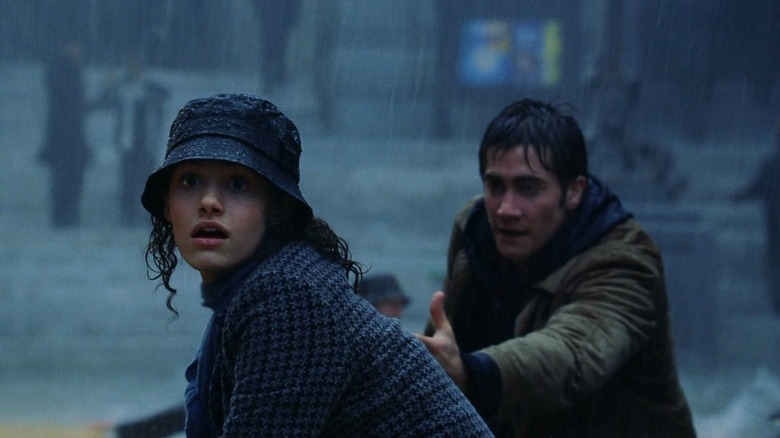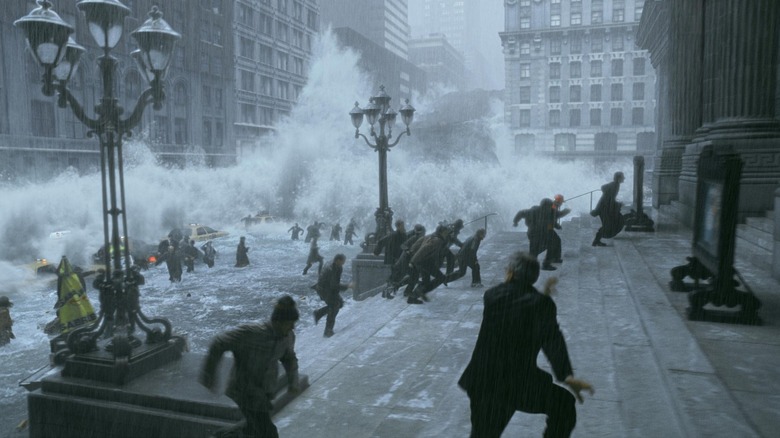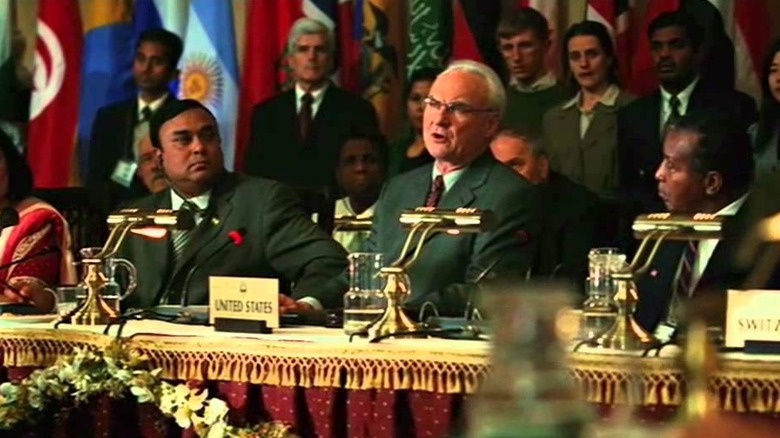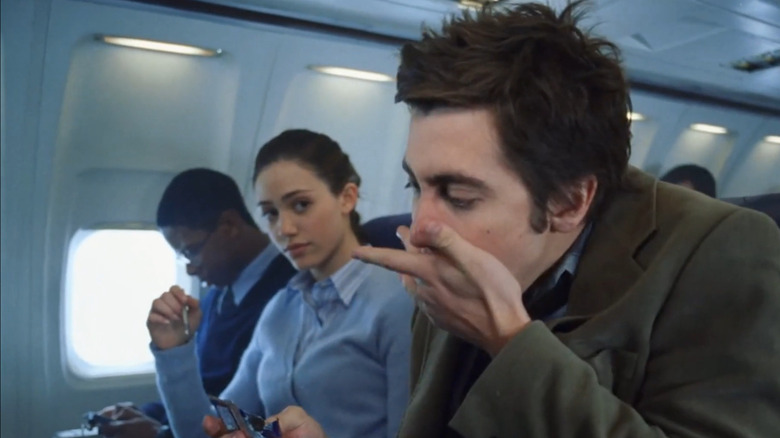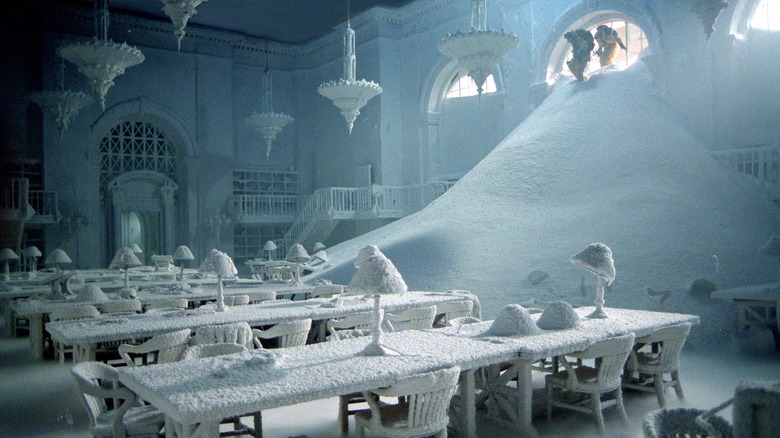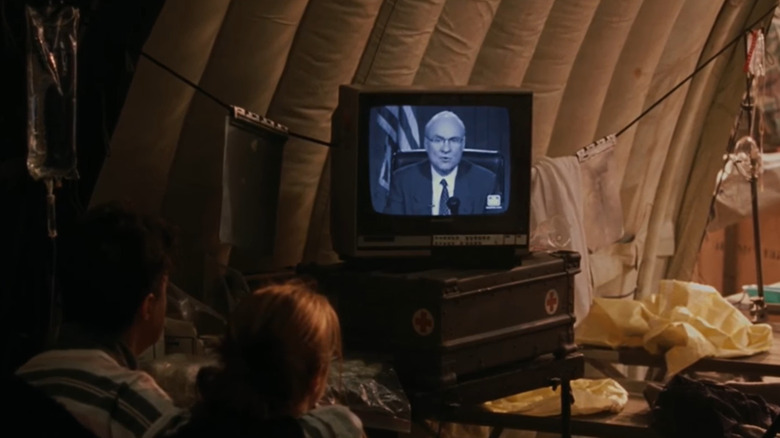The Day After Tomorrow Ending Explained: A Questionably-Delivered Message About Climate Change
I've always enjoyed "The Day After Tomorrow," and not just because I was a child when it first came out. Yes, the science behind what happens in the movie isn't great, and yes, there is not a single three-dimensional character to be found here, but the movie is basically a slasher film where the killer is Mother Nature, and you must admit that's kind of cool.
One issue with this movie is that, throughout the past few decades, we've seen director Roland Emmerich make plenty of other disaster movies and play around with the same sort of tropes, often in much more memorable ways. If you're looking for cool destructions of major landmarks, "Independence Day" has got it beat. If you're looking for absurdly over-the-top weather catastrophes, "2012" has got you covered. Meanwhile, this movie is actually trying to be a little realistic, so it can't get too crazy with the destruction it shows us. (It has to stick to grounded ideas, like a winter storm that turns you into an ice cube if you're in the middle of it.)
The big problem with this film is that, more so than most of Emmerich's other films, it's trying to make a serious point. It's a movie that bangs you over the head with the message that climate change is real and that we need to fight against it before its too late. It's a noble message, one that America politely ignored. While it would be absurd to blame the U.S. government's unwillingness to take major steps towards fighting climate change over the past 18 years on a single silly movie in 2004, one can't help but look at the movie and wonder: was this message delivered well? The answer is complicated.
What it did wrong
The obvious complaint against "The Day Against Tomorrow" is that the movie is basically the strawman version of what scientists say will happen if we didn't change things. You can go on any climate change-denying community, online or off, and you'll find climate skeptics pointing out with complete sincerity that all the predictions have already been proven wrong. "Wasn't the world supposed to be completely flooded already?" they'll say, pointing to some out-of-context source where it sorta sounds like a scientist in the '80s was saying the whole world would be underwater by now.
Of course, few people of note have actually made this claim. Climate deniers are usually thinking of that time in 2006 where Al Gore said we had 10 years before we reached the point of no return in stopping the worst effects of climate change. He was basically correct: when 2016 came and went with no real major changes, it was basically guaranteed that the climate change discussion would now be focused on how to manage the oncoming climate catastrophe, because stopping it completely was no longer an option. Gore's claim has not been disproven, but when 2016 came and went and the world didn't end, climate skeptics still patted themselves on the back because they thought they'd been vindicated.
They would've done this with or without "The Day After Tomorrow," of course, but did this movie have to make it so easy for them? It's a little frustrating to watch a giant tsunami hit Manhattan, and then watch multiple characters basically remark, "if only we had done more about climate change sooner!" It's almost hard to blame people for thinking climate activists are hysterical and alarmist when this is still one of the most high-profile films about the topic.
What it did right
Of course, it's hard to blame a silly disaster flick for indulging in silly disaster flick tendencies. Where the movie's messaging really does work is when it takes the absurdity of the damage done by this climate shift and contrasts it with the response of the movie's Vice President, Raymond Becker (Kenneth Welsh). "Who's going to pay the price of the Kyoto Accord?" he asks paleoclimatologist Jack Hall (Dennis Quaid) in the beginning of the movie. "It would cost the world's economy hundreds of billions of dollars!"
The movie has a pretty effective counter-argument to this, telling us, "Hey, you know what else is pretty expensive? When most of the northern hemisphere is suddenly rendered uninhabitable." As we watch Los Angeles get completely destroyed and a town in Japan get assaulted by softball-sized hail, Becker's concerns about maintaining the current world economy feel increasingly frustrating. He's not understanding just how trivial his current concerns actually are. What good is the economy when everyone's dead?
To Becker's credit, the movie gives him a character arc where he realizes the error of his ways. When the President dies in the storm, Becker takes up the role and gives the nation a speech where he admits he was wrong and how arrogant he was to think they could just keep using up natural resources without any repercussions. Nothing about this is subtle — and it feels particularly unrealistic to see the Dick Cheney stand-in character admit he was wrong about something — but it does work as an effective dismantling of one of the most common arguments made against climate reform.
The kids are alright
When it comes to teenage characters in this movie, the filmmakers could've gone in a bunch of different directions. They could've picked any reason for them to be in New York at the time of the tsunami, but the writers decided to have them all be gifted schoolkids participating in an academic decathlon. Sam (Jake Gylenhaal) in particular is characterized as a particularly smart, caring person, and is even punished at school in the beginning for being too smart for the teacher to believe he isn't cheating. It's admittedly a ridiculous way for the movie to show us he's smart — all Sam had to do was show his work on the exam — but it fits with the recurring theme of the incoming generation getting screwed over by the generation in charge.
In any sort of disaster movie, the characterization of the youngest characters is usually key to what the writers are trying to say about the world. After all, the kids are the future, and they're going to be rising to leadership positions in this new world a couple years down the line. So for the most part, "The Day After Tomorrow" depicts the younger generation as consistently smart and resourceful the whole way through. There are no troubled kid characters like in "2012" or Emmerich's later film "Moonfall." The young people here have their heads on straight, and are exactly the sort of people we'd need as climate change starts to impact our society in increasingly major ways. It's a particularly good writing choice for the movie, considering the tone of its finale.
The storm passes
Something cool happens in the second half of this film, something that doesn't happen in "2012" until the very end: it turns into a feel-good movie, sort of. The library the kid characters are camping out in is remarkably cozy-looking, before and after it's almost completely frozen. All the surviving characters are working together as a community, and even before the eye of the storm hits there's this growing sense that the worst is over. If they can make it this far, the movie seems to be telling us throughout the final hour, they can make it through everything.
Slowly, things are revealed to be not quite as lost as they seemed at the beginning. Lucy (Sela Ward) thought she was abandoned at her hospital with a child cancer patient, but an ambulance driver manages to make it over there to save her at the last moment. The middle of the movie does the seemingly cynical thing of introducing a massive border crisis as Americans attempt to flee into Mexico — a very "haha, isn't that embarrassing?" sort of moment — but President Becker reveals that he's made a groundbreaking deal with all the Latin American countries to guarantee a peaceful transition. When Jack gets himself and the library survivors airlifted out of New York, we see from the people on the rooftops that Sam's group was far from the only survivors.
Rejecting doomerism
It all feels a little too easy in a way. Yes, "Independence Day" pulled off a happy ending despite millions of people dying, but at least there the characters got to beat up some aliens. Here, the storm simply passes. The characters don't get to fight anything, except for some wolves for a few minutes there. When we're told that the storm has passed and the air feels as clean as its ever been, it's easy for this to feel like a clichéd happy Hollywood ending tacked on to an otherwise depressing story. But at the very least this is thematically consistent: the movie wants us to know that no matter how bad the climate gets in the coming years, we shouldn't just give us hope.
A lot of people who are reasonably well-informed about climate change have a tendency to descend into depression or nihilism. It's easy to fall into the mindset that Laura (Emmy Rossum) briefly falls into when dealing with a fever in the storm, where she tells Sam, "Everything I've ever cared about, everything I've worked for, has all been preparation for a future that no longer exists." As we look at the often terrifying implications of the current data, it's often easy to fall into the same trap, wondering what's the point of trying anything if everything's going to end soon.
But as the ending here makes clear, the world isn't actually going to end. Even if things get insanely, cinematically terrible, there are still going to be people around and we're still going to need people to work together and navigate this new, chaotic world. "The Day After Tomorrow" is a dumb movie in a lot of ways, but the smartest thing it does is end on an optimistic note.
